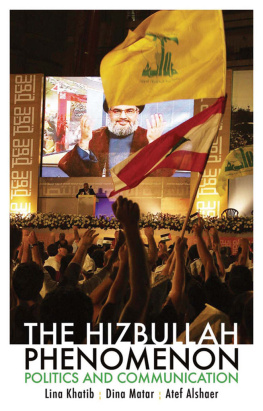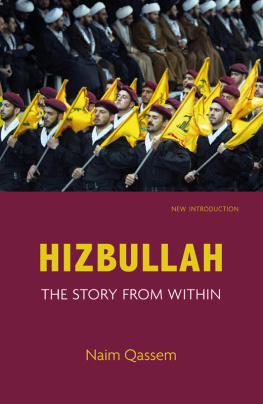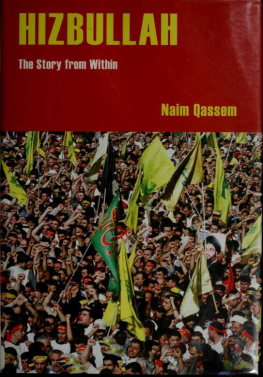Lina Khatib - The Hizbullah Phenomenon
Here you can read online Lina Khatib - The Hizbullah Phenomenon full text of the book (entire story) in english for free. Download pdf and epub, get meaning, cover and reviews about this ebook. year: 2014, publisher: Oxford University Press, genre: Politics. Description of the work, (preface) as well as reviews are available. Best literature library LitArk.com created for fans of good reading and offers a wide selection of genres:
Romance novel
Science fiction
Adventure
Detective
Science
History
Home and family
Prose
Art
Politics
Computer
Non-fiction
Religion
Business
Children
Humor
Choose a favorite category and find really read worthwhile books. Enjoy immersion in the world of imagination, feel the emotions of the characters or learn something new for yourself, make an fascinating discovery.
- Book:The Hizbullah Phenomenon
- Author:
- Publisher:Oxford University Press
- Genre:
- Year:2014
- Rating:3 / 5
- Favourites:Add to favourites
- Your mark:
- 60
- 1
- 2
- 3
- 4
- 5
The Hizbullah Phenomenon: summary, description and annotation
We offer to read an annotation, description, summary or preface (depends on what the author of the book "The Hizbullah Phenomenon" wrote himself). If you haven't found the necessary information about the book — write in the comments, we will try to find it.
The Hizbullah Phenomenon — read online for free the complete book (whole text) full work
Below is the text of the book, divided by pages. System saving the place of the last page read, allows you to conveniently read the book "The Hizbullah Phenomenon" online for free, without having to search again every time where you left off. Put a bookmark, and you can go to the page where you finished reading at any time.
Font size:
Interval:
Bookmark:
Politics and Communication


Oxford University Press, Inc., publishes works that further Oxford Universitys objective of excellence in research, scholarship, and education.
Oxford New York
Auckland Cape Town Dar es Salaam Hong Kong Karachi
Kuala Lumpur Madrid Melbourne Mexico City Nairobi
New Delhi Shanghai Taipei Toronto
With offices in
Argentina Austria Brazil Chile Czech Republic France Greece
Guatemala Hungary Italy Japan Poland Portugal Singapore
South Korea Switzerland Thailand Turkey Ukraine Vietnam
Copyright 2014 Lina Khatib, Dina Matar, Atef Alshaer
Oxford is a registered trade mark of Oxford University Press in the UK and certain other countries.
Published by Oxford University Press, Inc
198 Madison Avenue, New York, New York 10016
Published in the United Kingdom in 2014 by C. Hurst & Co. (Publishers) Ltd.
www.oup.com
Oxford is a registered trademark of Oxford University Press
All rights reserved. No part of this publication may be reproduced, stored in a retrieval system, or transmitted, in any form or by any means, electronic, mechanical, photocopying, recording, or otherwise, without the prior permission of Oxford University Press.
Library of Congress Cataloging-in-Publication Data
Khatib, Lina.
The Hizbullah phenomenon : politics and communication / Lina Khatib, Dina Matar, Atef Alshaer.
pages cm
ISBN 978-0-19-938440-2 (paperback)
eISBN 978-0-19-025758-3
1. Hizballah (Lebanon) 2. Political parties--Lebanon. 3. Lebanon--Politics and government. I. Matar, Dina. II. Alshaer, Atef. III. Title.
JQ1828.A98H62466 2014
324.25692082--dc23
2014004953
Dina Matar and Lina Khatib
Lina Khatib
Dina Matar and Atef Alshaer with Lina Khatib
Lina Khatib
Atef Alshaer
Dina Matar
Lina Khatib and Dina Matar
The authors would like to thank the Leverhulme Trust in the UK for generously supporting the research for this book through a Research Project Grant.
Thanks are due to the following people who have assisted with research: Jacqueline Barkett, Mona El-Hamdani, Elizabeth Buckner, Hikmat El-Khatib, Hisham Issa, Maha Issa, Zahera Harb, Tarik Harb, the Harb family in Lebanon, Amal Saad-Ghorayeb, Yousef Chweiri, Sophia Saadeh, Muna Sukkariyeh and Kay Dickinson; Khalil Ahmad Issa for reciting some of the poems quoted in ; and Hizbullahs Media Relations Department personnel.
Thanks to Elias Muhanna for providing valuable comments on parts of this book and to Nadim Shehadi for his support.
An early version of
Hizbullah, the Lebanese Party of God, is a late twentieth-century phenomenon, the outcome of a series of socio-historical and political junctures marked by domestic political upheaval and regional conflicts. It also has long-term strategic links with Syria, which has acted as a conduit for the supply of arms and personnel from Iran and serves as an important ally in domestic politics. In the space of thirty years, Hizbullah has established itself as the most powerful political force in Lebanon and as a dynamic actor in the broader region through its use of a sophisticated political communication strategy which blends military, social, economic and religious elements while remaining adaptive to changing socio-political contexts. This strategy, as this book will show, has been a central tool that the group has used to disseminate its image and ideology.
Hizbullahs emergence as an Islamic jihadi group in 1982 came at a new nadir in Lebanons prolonged and complex history of domestic In 1969 he became head of the Lebanese Supreme Shiite Council and in 1974 he founded the Movement of the Deprived to help the poor and dispossessed in Lebanon regardless of their sectarian or ethnic affiliations, although the movement came to be strongly associated with the Shiite community. A year later he established the paramilitary group Afwaj al-muqawama al-lubnaniya (the Brigades of the Lebanese Resistance), known by its acronym Amal, an activist movement involved in social and political reform and the liberation of South Lebanon.
Hizbullah bears many similarities to the other Islamist parties that emerged in the twentieth century. But unlike other regional Islamist movements, such as the Egyptian Muslim Brotherhood, whose principal raison dtre was to oppose authoritarian regimes, Hizbullah emerged in a country with a long history of open struggles, where power with other political forces in Lebanon.
Hizbullahs ideological aims and political intentions were not made public until the publication of its 1985 manifesto, the Open Letter. This document detailed the groups ideology and presented an image of Hizbullah as a grassroots Islamist jihadi movement that sought to establish an Islamic state in Lebanon on a similar basis to Irans wilayat al-faqih (the guardianship of the jurisprudence)
To this end, when competing Lebanese factions signed the Taif Accord (which ended the countrys fifteen-year civil war in 1989), Hizbullah began a concerted policy of infitah, or opening up, which was designed to integrate the movement into the Lebanese political and social spheres and to ease its transformation into a distinct Lebanese political party. This goal was to be achieved largely by playing according tothough also by manipulatingthe rules set by the existing political regime. Thus in 1992, headed by the charismatic Sheikh Hassan Nasrallah as its Secretary General, the group participated in Lebanons first post-civil war elections, a move that marked a distinct phase in its gradual integration into Lebanons multi-confessional system. Throughout the 1990s, Hizbullah consistently presented a public image that was intended to show that its transformation from an Islamist movement into a mainstream political party was authentic and legitimate. It also sought to demonstrate that it was a nationalist rather than a purely Islamic movement, a tactic that allowed it to maintain its Islamic identity while accommodating Lebanons Christian population and liberal components of Lebanese society. In May 2000 Hizbullah increased its share of seats in the new parliamentary elections held after the Israeli withdrawal from southern Lebanon, an event in which the group had played a major role, thereby strengthening its identity as a national party and heralding a new phase of political jihad to enhance its domestic position as a civilian political party accommodated by the Lebanese political system. The liberation of southern Lebanon, Hizbullahs support for the second Palestinian intifada (uprising) from 2000 onwards and its public condemnation of the US-led war on terror and invasion of Iraq further increased its bargaining power in the domestic sphere and enhanced its regional reputation.
Within five years, Hizbullahs war of position with Lebanese political parties and civilians opposed to its insistence on maintaining arms and its relationship with Syria turned into open political confrontation in the 2005 Cedar Revolution following the assassination of the former Lebanese Prime Minister Rafic Hariri on 14 February 2005. The July 2006 war with Israel, however, helped change the balance of power in Hizbullahs favour by furnishing the group with an opportunity to re-indigenise its image as a national Lebanese party. The 2006 war began when Israel responded with a disproportionate display of force to a provocation by Hizbullah in the Souththe subsequent armed conflict killed more than 1,000 people, mostly Lebanese nationals, and displaced 1 million others. Although Israel managed to destroy most of Hizbullahs strategic missile arsenal and a large number of its rocket launchers, the movements endurance in the face of the attacks allowed it to present itself as the victor. While the outcome of the war was ultimately inconclusive, this did not prevent Hizbullahs charismatic and powerful leader Hassan Nasrallah from describing it as a Divine Victory, thus strengthening Hizbullahs image as an Arab national force within Lebanon and beyond.
Font size:
Interval:
Bookmark:
Similar books «The Hizbullah Phenomenon»
Look at similar books to The Hizbullah Phenomenon. We have selected literature similar in name and meaning in the hope of providing readers with more options to find new, interesting, not yet read works.
Discussion, reviews of the book The Hizbullah Phenomenon and just readers' own opinions. Leave your comments, write what you think about the work, its meaning or the main characters. Specify what exactly you liked and what you didn't like, and why you think so.













